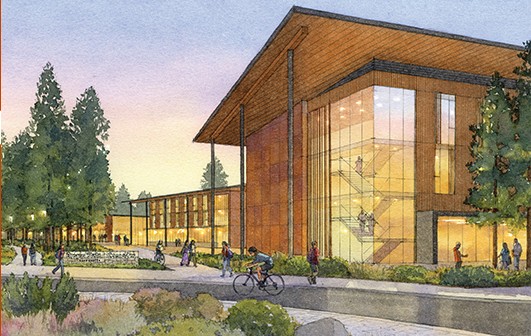After a tense, five hour appeal hearing last week, the Bend City Council unanimously rejected an appeal of a hearings officer Ken Helm’s approval of Oregon State University-Cascades proposed west-side campus. While the decision is another setback for opposition group, Truth-In-Site (TIS), they remain steadfast in their charge against the location and plan for the new university.
“We think it was an appropriate decision,” says Kelly Sparks, associate vice president of finance and strategic planning for OSU-Cascades. “We wrote our proposal with a burden of proof based upon recommendations. The council interpreted it properly.”
The controversy centers around the location choice for the new campus; specifically parking, traffic and a lack of a complete master plan for the 10-acre, plus an additional 46-acre optional purchase, site near the SW Century Drive and Chandler Avenue roundabout. However, the September 29 deliberations focused solely on a September 2 independent hearing officer’s ruling that the proposal fit within city development code.
Both sides declared victory as the ruling leaned towards OSU-Cascades, but city council members comments left the door open for more discussion. While the council members voted unanimously 6-0 (with Scott Ramsey absent), they did add some additional conditions.
“The council has no say on where this (campus) is placed,” City Councilor Mark Capell summed up. “All we have a say on is what they’re asked to do – does it fit within our code? It’s not, do we like the site or dislike the site or do we want it somewhere else.”
Attorneys Jeffrey Kleinman for TIS and Steve Janik for OSU-Cascades, along with representatives from both sides were allowed to make arguments for how the city code should be applied in the chamber meeting. The councilors will adopt the written findings at their October 15 council meeting.
The issue taking center stage at the meeting by both the opposition and the university was whether OSU-Cascades should be required to complete a master plan for the entire 56-acre possible development. TIS had argued earlier that because the university hopes to expand into the adjacent 46-acre property, they should be required to develop a master plan including said land.
To which, Janik argued, “Why would we plan for 56 acres when we don’t know there’ll be demand for it?”
The council did mandate a full master plan must be submitted if the need for the additional 46 acres arises. The council also asked the university to make provisions if the proposed 320 parking spaces proves to be insufficient and leads to parking problems for the surrounding neighborhoods.
Lastly, councilor members seemed willing to allow OSU-Cascades to try to match its goal of 30 percent of students and staff walk, bike or use public transportation, but they did worry about the lack of student housing in the area.
“The process has shown the need for ongoing community participation in what the campus will look like and the facilities available,” says Sparks.
“We are excited,” says Scott Morgan, TIS co-founder. “The hearings officer basically said there is validity in our arguments. Now the city council has expressed some concerns as well.”
At the session, Morgan brought up the possibility of economic growth in other sites, such as Juniper Ridge. He also noted that Monday’s start to Central Oregon Community College’s fall term led to 85 cars parked illegally because of the limited parking. For the first time in the review process, TIS argued OSU-Cascades should be required to create a master plan for the 10-acre site, but got shot down by Assistant City Attorney Gary Firestone due to code restrictions.
Following the hearings officer’s report, the city council chambers meeting was the second step in the already lengthy and costly battle for Central Oregon’s proposed university. After the city council signs off on the written version of the decision at their October 15 meeting, the opposition has 21 days to appeal to the State of Oregon’s Land Use Board of Appeals. Following LUBA’s decision, the next step is the State Court of Appeals and finally the State Supreme Court.
“The council couldn’t find a way to force OSU-Cascades to do it right,” says Morgan. “We are excited to submit to the Land Use Board of Appeals. We believe there are a couple of points the city missed, so we will submit the written, legal findings.”
On the other hand, OSU-Cascades is moving ahead with their designs and further preparations for opening the new campus. Next on their agenda is working out the interior design and exact plans for how the land will be divided.
“We will wait to see how they are going to proceed with any appeal,” explains Sparks.“In the meantime, we are excited to relaunch our design planning and how we meet our goals for our students and community.”
The TIS opposition group is prepared for the long fight over what they call a very important decision, “affecting not only ourselves, but our grandchildren” they insist. Morgan reported that they continue to receive support, including an unsolicited $5,000 donation, gifted on the day the hearings officer’s report came out.
“This is like a baseball game,” explains Morgan. “They may have hit a two-run homer, but it’s only the second inning! The longer this goes on, the more support we garner, the more money we raise, and the more people start to question if this is right. We are not going away.”
Coincidentally, the hearing was held on the first day of classes for OSU-Cascades. Both returning students and those attending for the first time met their professors, bought their books and prepared for the fall term’s school work.
“The energy of the students reminds us why we are doing this,” explains Sparks. “We look forward to working with the Bend and Central Oregon community in developing this campus and determining what programs to bring to the community.”




